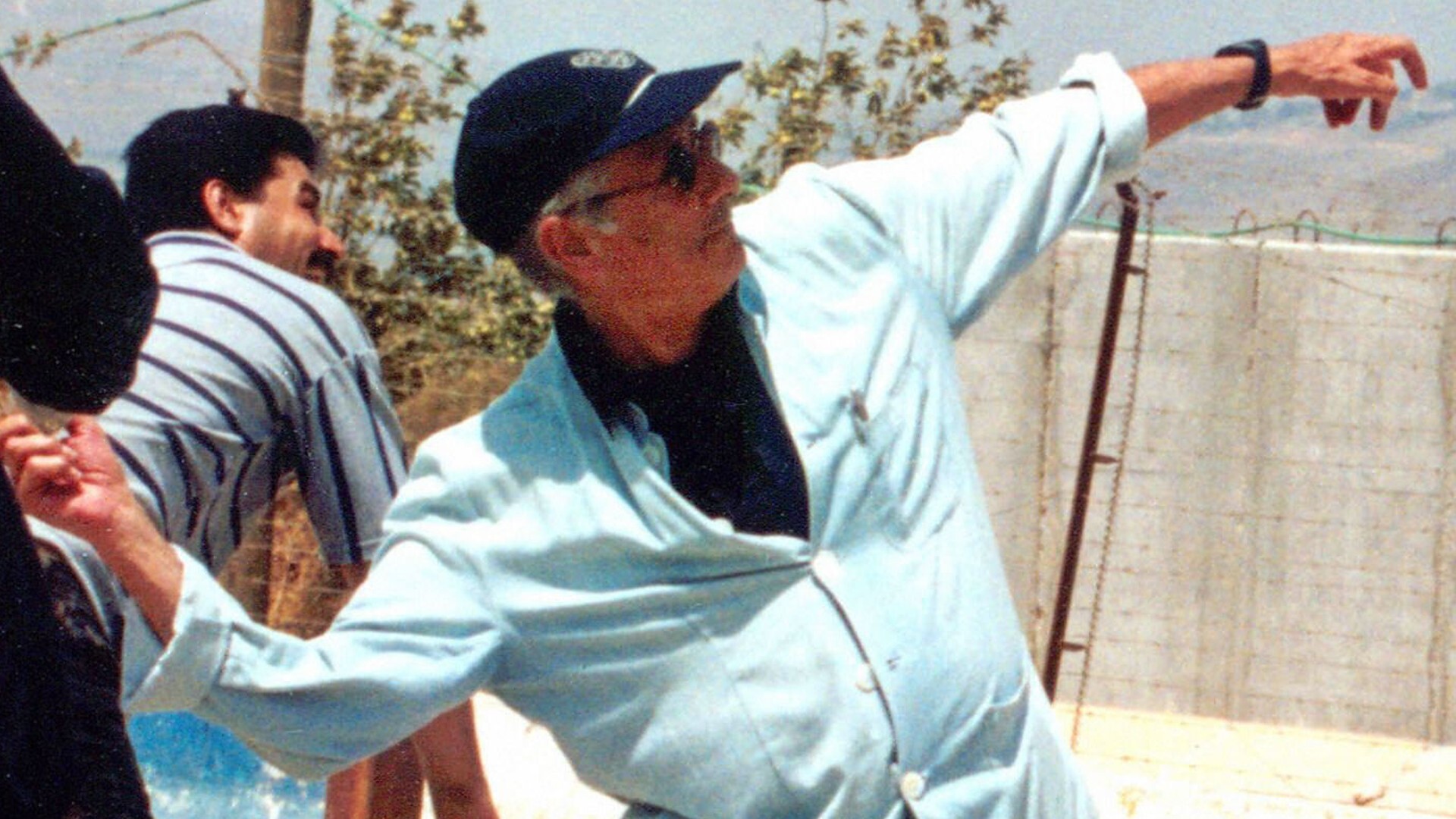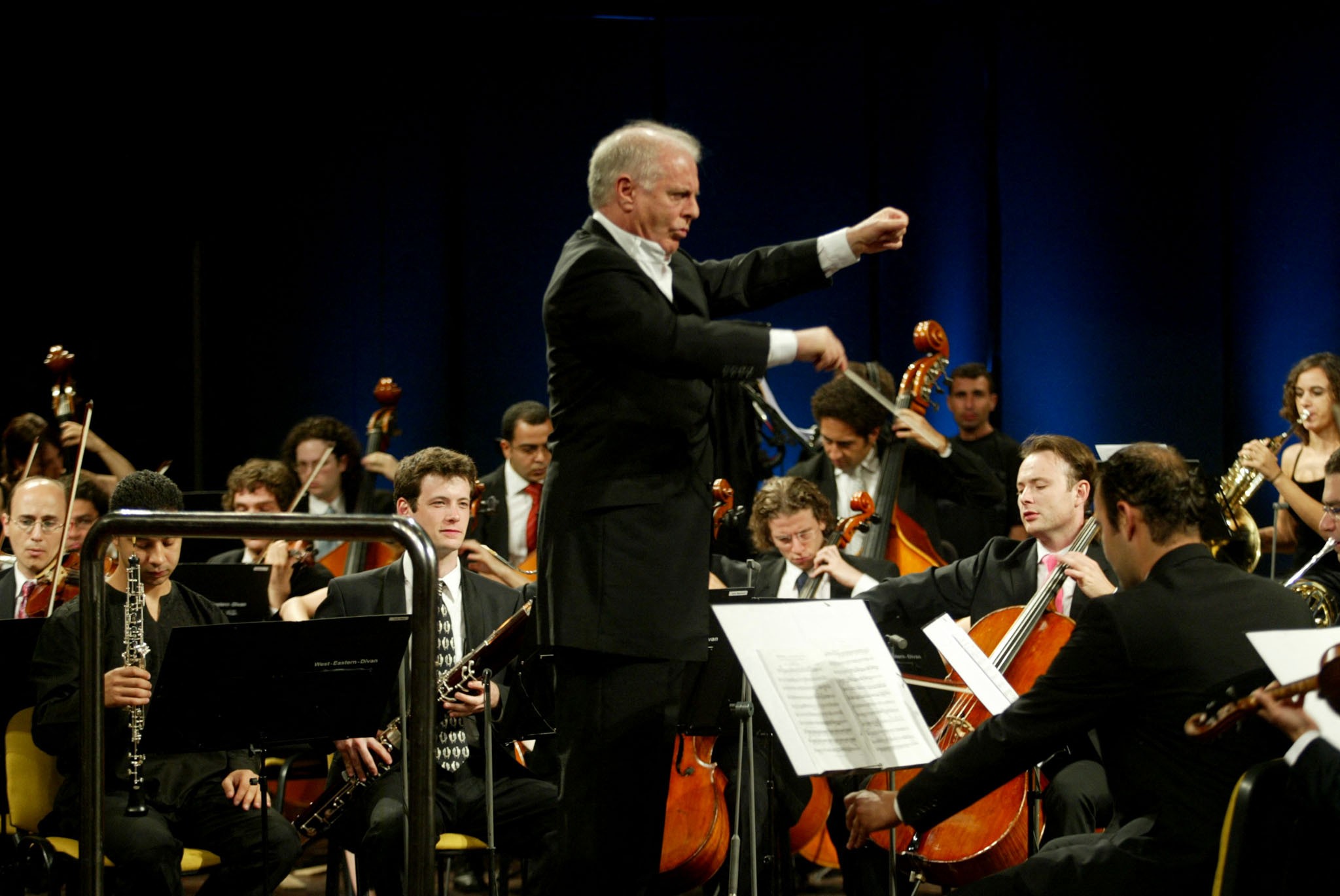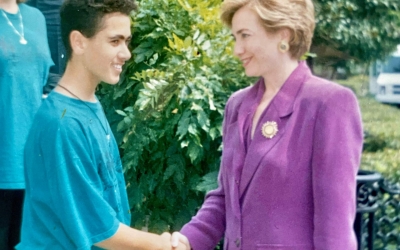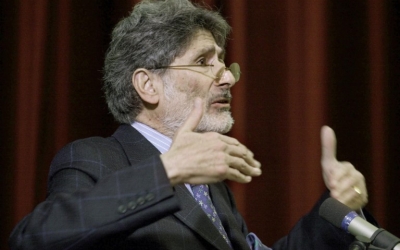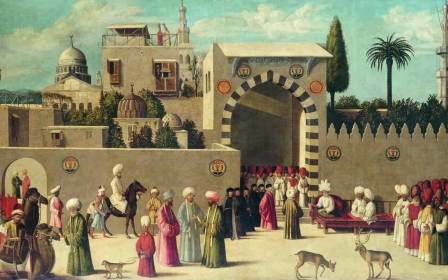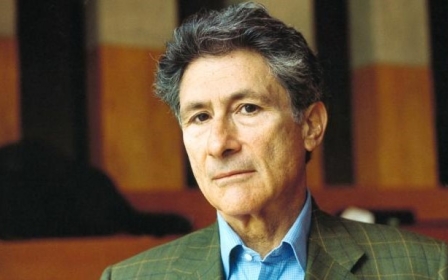Twenty years on: Edward Said's life and writings, in seven quotes
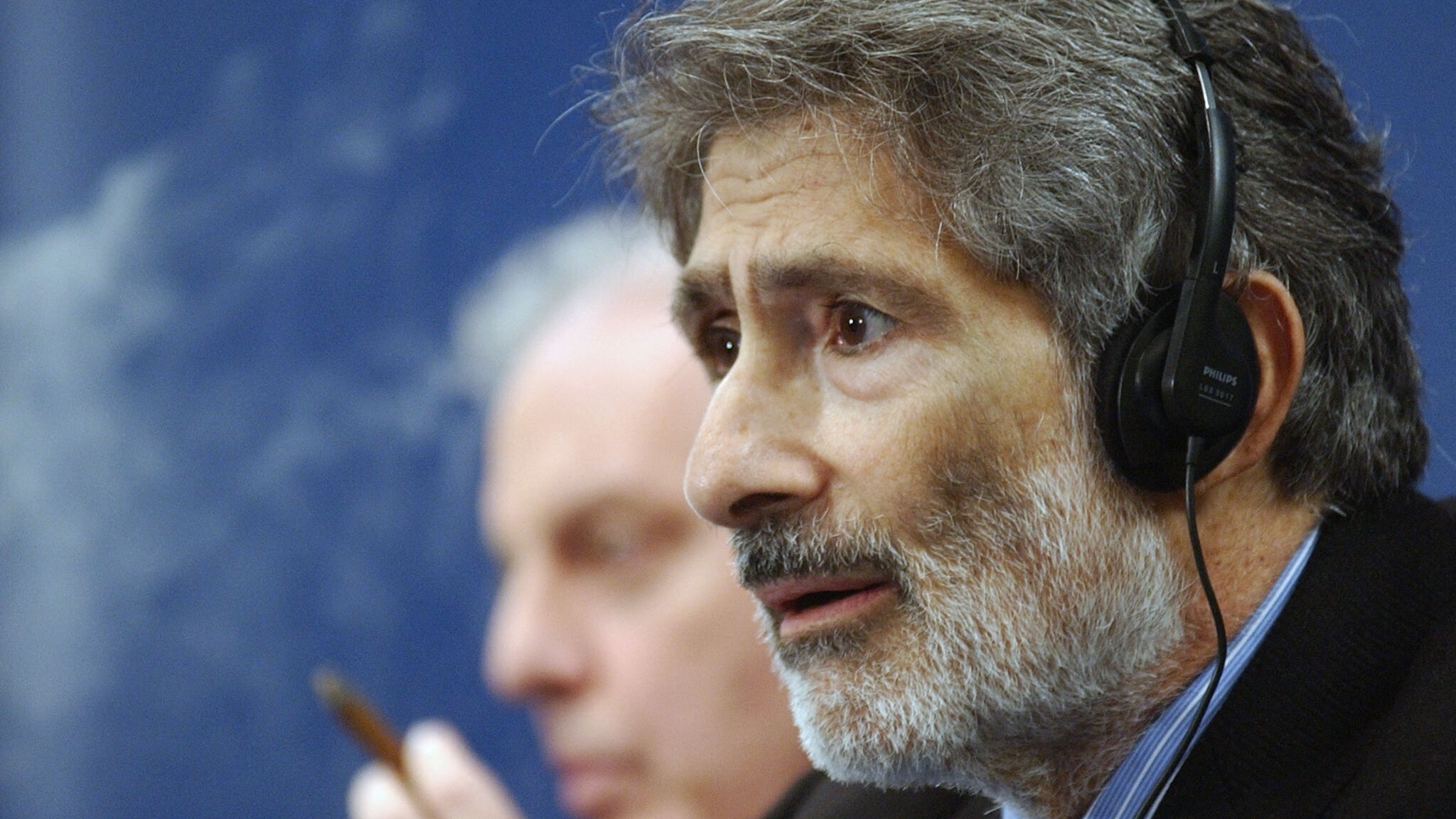
Edward Said, the renowned Palestinian-American academic, writer, thinker, and activist, died 20 years ago today, on 25 September 2003.
Born in 1935 to Palestinian-Christian parents in Jerusalem, then part of British-governed Mandatory Palestine, his early life would be defined by dispossession and upheaval.
He spent his early years between Jerusalem and Cairo, settling permanently in the latter after the Nakba, or catastrophe, the ethnic cleansing of Palestine which took place to make way for the creation of Israel in 1948.
He was later educated and worked in various cities across the United States, studying at Princeton and Harvard, before joining the faculty of Columbia University in 1963 - where he remained for forty years.
He went on to write several books on music, media representation, literature, and colonialism, including Orientalism - said to be one of the most influential texts of the 20th century.
New MEE newsletter: Jerusalem Dispatch
Sign up to get the latest insights and analysis on Israel-Palestine, alongside Turkey Unpacked and other MEE newsletters
He also wrote extensively about Palestine, and even had a short career in Palestinian politics and diplomacy.
He was criticised and vilified throughout his life, including by Palestinian leaders, who briefly censored his writings following outspoken criticism of their perceived failings.
He died of leukemia aged 67, but his legacy lives on twenty years later. Middle East Eye takes a look at his life and writings, inspired by seven of his quotes:
Arabic language
“I have never known what language I spoke first, Arabic or English, or which one was really mine beyond any doubt.”
Said’s upbringing was one of competing and overlapping identities, languages and cultures. He explores those competing themes at length in his memoir, Out of Place, first published in 1999.
In it, he talks about how his name encapsulates that feeling of duality.
“It took me about fifty years to become accustomed to, or, more exactly, to feel less uncomfortable with, Edward, a foolishly English name yoked forcibly to the unmistakably Arabic family name Said,” he wrote.
Said spent his formative years at British-style public schools in both Jerusalem and Cairo, while summering in Dhour el-Choueir, a mountainous town in Lebanon. Later, he was sent to a private school in Massachusetts.
On English and Arabic, Said wrote: “The two have always been together in my life, one resonating in the other, sometimes ironically, sometimes nostalgically, most often each correcting, and commenting on, the other.
Each can seem like my absolutely first language, but neither is.”
As well as being fluent in Arabic, English and French, Said was also proficient in Spanish, German, Italian, and Latin.
Palestinian cause
“Until the June 1967 war, I was completely caught up in the life of a young professor of English.”
Though Said is widely remembered for his views on Palestine, he wasn't always outspoken on politics and human rights.
He started his academic career focused solely on literary theory. But in 1967, the Middle East war changed that.
During the war, Israel triumphed against Syria, Egypt, and Jordan, occupying the Sinai Peninsula, the Golan Heights, the Gaza Strip, the West Bank, and East Jerusalem.
“Beginning in 1968, I started to think, write, and travel as someone who felt himself to be directly involved in the renaissance of Palestinian life and politics,” he said.
He recounted that following the war, being in New York was “probably the most shattering experience of my life”.
“I was surrounded on all sides by people who identified with the Israeli victors,” Said said.
In his memoir, he described the personal impact of his aunt Nabiha, who he witnessed in Cairo dedicating her life to helping Palestinian refugees, following the 1948 displacement.
But it would be two decades later, and another war in 1967, that would propel him into becoming one of the most famous advocates for the Palestinian cause.
He went on to write several books on his homeland, including The Question of Palestine (1979), The Politics of Dispossession (1994), and The End of the Peace Process: Oslo and After (2000).
Music
“The study of music is one of the best ways to learn about human nature.”
Outside of his political and literary interests, Said was a pianist and a lover of classic music.
In the quote above, taken from his book Parallels & Paradoxes: Explorations in Music and Society, Said lamented about the lack of musical education in school curriculums.
“To play music well, you need to strike a balance between your head, your heart, and your stomach,” he said.
“And if one of the three is not there or is there in too strong a dose, you cannot use it. What better way than music to show a child how to be human?”
The book was jointly written in 2002 with his friend, Daniel Barenboim, a prominent Israeli conductor, with whom Said set up the West-Eastern Divan Orchestra.
The orchestra features Israeli and Arab musicians, a fact which earned Said criticism among Palestinians who support a cultural boycott against Israel.
Said's proficiency in the piano has been described as “near concert level”. He has also written four books on music and was The Nation magazine's music critic for several years.
Definition of terrorism
“The definition of terrorism has to be more precise, so that we are able to discriminate between, for example, what it is that the Palestinians are doing to fight the Israeli military occupation and terrorism of the sort that resulted in the World Trade Center bombing.”
Speaking just months after the September 11 attacks, he questioned the definition of the term “terrorism”.
He drew the theoretical example of a young man living in besieged Gaza “who straps dynamite around himself and then throws himself into a crowd of Israelis”.
“That can be understood as the act of a truly desperate person trying to free himself from unjustly imposed conditions. It's not something I agree with, but at least you could understand it,” Said remarked.
On the contrary, he said: “The people who perpetrated the terror of the World Trade Center and Pentagon bombings are something different because these people were obviously not desperate and poor refugee dwellers.”
Said long rejected the use of violence, but often noted that he understood its use.
In 2000, a terminally ill Said was pictured throwing a stone from Lebanon towards the Israeli border.
His detractors used it as evidence that he was “a professor of terror”, but Said said it was a symbolic gesture after the end of Israel’s occupation of southern Lebanon. There were calls for his censure at Columbia, but the university took no action.
Said was often accused of extremism and terrorism, and the FBI kept a 238-page file on him. He was once dubbed a "prophet of political violence".
Aside from Columbia University's president, he was the only staff member to have a buzzer that went directly to campus security and bulletproof windows in his office.
Rejected Oslo agreement
“I am for peace. And I am for a negotiated peace. But this accord is not a just peace.”
In 1977, Said was elected to the Palestinian National Council (PNC) as an independent member. He was not aligned with any faction, including then-leader Yasser Arafat’s Palestine Liberation Organisation (PLO).
He advocated for the two-state solution, a policy that the PNC adopted in the late 1980s.
Said was sent by Arafat in 1988 to negotiate with then-US Secretary of State George Shultz on behalf of the Palestinians.
But as negotiations were ongoing for what in 1993 would be called the Oslo Accords, Said became increasingly disillusioned. He resigned from the PNC in 1991.
He believed that Palestinian leaders had given far too many concessions and had failed to negotiate for an independent Palestinian state.
He also believed that Arafat had failed to advocate for the right of return for Palestinian refugees that were displaced in 1948, and ignored the threat of illegal Israeli settlements built on Palestinian territory.
Despite being one of the most famous Palestinians of his lifetime, he then became the subject of censorship and criticism by the leaders he had once represented.
“When the current Palestinian authorities jail newspaper editors and torture prisoners, they are merely doing Israel's dirty work,” Said told the New York Times in 1996.
“Israel and the Western governments want Arafat to repress certain elements of his society. They want him to be a dictator. The mechanism of the peace accord makes this perfectly clear.”
“I am for peace. And I am for a negotiated peace. But this accord is not a just peace.”
One-state solution
"I see no other way than to begin now to speak about sharing the land that has thrust us together, and sharing it in a truly democratic way, with equal rights for each citizen"
Though he initially supported a two-state solution in the late 1980s, by 1999 Said found that position “unworkable”.
Following the Oslo Accords, he noted the growing Israeli settlements being built on Palestinian land, and the increasingly segregated societies.
“Israel has built an entire system of ''bypassing'' roads, designed to go around Palestinian towns and villages, connecting settlements and avoiding Arabs,” he wrote in a New York Times column.
“But so tiny is the land area of historical Palestine, so closely intertwined are Israelis and Palestinians, despite their inequality and antipathy, that clean separation simply won't, can't really, occur or work.”
He concluded that the only way out was a “one-state solution”, in which all citizens have equal rights.
“There can be no reconciliation unless both peoples, two communities of suffering, resolve that their existence is a secular fact, and that it has to be dealt with as such.”
He said that both the notion of Israel as a land for the Jewish people and of Palestine as an Arab land “need to be reduced in scale and exclusivity”.
Orientalism
“The Orientalist holds the key to the West's self-affirmation and control over the exotic and mysterious Orient.”
Without a doubt, Said’s most influential book is Orientalism, first published in 1978.
In it, the Palestinian academic explained how westerners, or “Orientalists”, as far back as Napoleon's invasion of Egypt in 1798, perpetuated views of the Middle East, North Africa and Asia, or “the Orient”, as inferior, weak and barbaric.
Such ideas, peddled by artists, thinkers and scientists, according to Said, create a stereotypical and sometimes racist worldview, which can then be used to justify imperialism and colonialism.
It is considered to be one of the foundational texts in the study of postcolonialism, and a retelling of the European Enlightenment through a new lens.
The book is still on curricula all over the world and catapulted Said into becoming one of the leading thinkers of his generation. It has been translated into at least 35 languages.
It garnered criticism and has been described as anti-western, which Said addressed in two later versions of the book.
Middle East Eye delivers independent and unrivalled coverage and analysis of the Middle East, North Africa and beyond. To learn more about republishing this content and the associated fees, please fill out this form. More about MEE can be found here.


